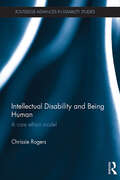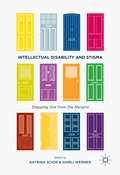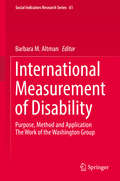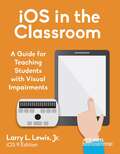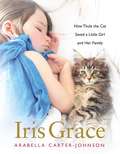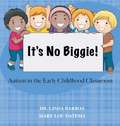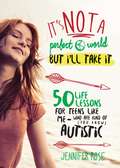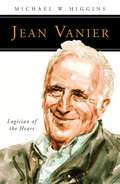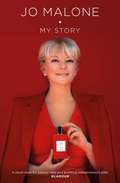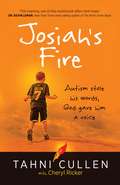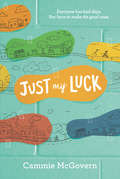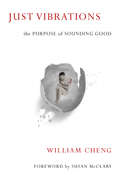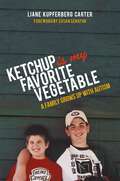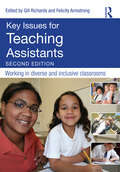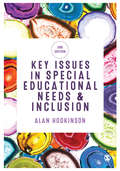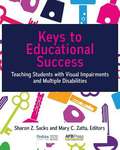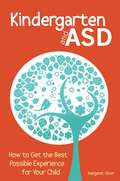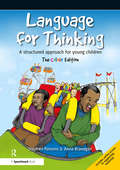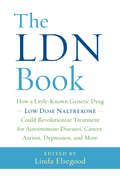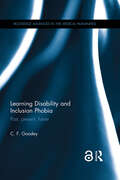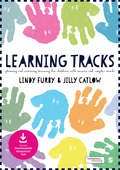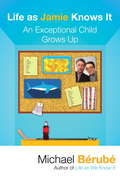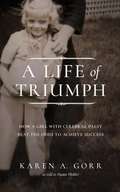- Table View
- List View
Intellectual Disability and Being Human: A Care Ethics Model (Routledge Advances in Disability Studies)
by Chrissie RogersIntellectual disability is often overlooked within mainstream disability studies, and theories developed about disability and physical impairment may not always be appropriate when thinking about intellectual (or learning) disability. This pioneering book, in considering intellectually disabled people's lives, sets out a care ethics model of disability that outlines the emotional caring sphere, where love and care are psycho-socially questioned, the practical caring sphere, where day-to-day care is carried out, and the socio-political caring sphere, where social intolerance and aversion to difficult differences are addressed. It does so by discussing issue-based everyday life, such as family, relationships, media representations and education, in an evocative and creative manner. This book draws from an understanding of how intellectual disability is represented in all forms of media, a feminist ethics of care, and capabilities, as well as other theories, to provide a critique and alternative to the social model of disability as well as illuminate care-less spaces that inhabit all the caring spheres. The first two chapters of the book provide an overview of intellectual disability, the debates surrounding disability, and outline the model. Having begun to develop an innovative theoretical framework for understanding intellectual disability and being human, the book then moves onto empirical and narrative driven issue-based chapters. The following chapters build on the emergent framework and discuss the application of particular theories in three different substantive areas: education, mothering and sexual politics. The concluding remarks draw together the common themes across the applied chapters and link them to the overarching theoretical framework. An important read for all those studying and researching intellectual or learning disability, this book will be an essential resource in sociology, philosophy, criminology (law), social work, education and nursing in particular.
Intellectual Disability and Stigma
by Shirli Werner Katrina SciorThis book examines how intellectual disability is affected by stigma and how this stigma has developed. Around two per cent of the world's population have an intellectual disability but their low visibility in many places bears witness to their continuing exclusion from society. This prejudice has an impact on the family of those with an intellectual disability as well as the individual themselves and affects the well-being and life chances of all those involved. This book provides a framework for tackling intellectual disability stigma in institutional processes, media representations and other, less overt, settings. It also highlights the anti-stigma interventions which are already in place and the central role that self-advocacy must play.
International Measurement of Disability
by Barbara M. AltmanThis volume provides an informed review of the accomplishments of the Washington Group on Disability Statistics (WG) in the provision of international data and statistics on disability. It does so within the context of the UN Convention on the Rights of Persons with Disabilities. The volume includes a description of the development and testing of a short set of questions for Censuses, now used in approximately 29 countries and recommended in the U. N. 's Principles and Recommendations for Population and Housing Censuses: The 2020 Round, which includes disability as a core topic to be collected in censuses. It discusses the experiences of several countries on the use of the WG questions and how this has impacted on national agendas in the area of disability. It follows the development and testing of an extended set of questions for use in national surveys other than censuses and examines the challenges of translation and the importance of generating comparable question sets in different languages and within different cultures. It studies the examination of cognitive testing techniques in a variety of countries, and presents the results of the first round of censuses in 2010 in countries using the six question set. The volume includes discussions of the new development of question modules on a broad range of child disability and functioning, and the environmental contexts of participation that are part of the current work of the WG. In addition, it contains a reflection on the use of the WG's functionality approach to identifying disabilities by humanitarian agencies to identify disabilities in populations of displaced persons. A thoughtful conclusion addresses what the development of cross-nationally comparable data can mean for the improvement of circumstances for all persons with disabilities.
IOS in the Classroom: A Guide for Teaching Students with Visual Impairments
by Larry L. Lewis Jr.iOS in the Classroom is a fully illustrated step-by-step guide to teaching the use of the iPad running iOS 9 to students with visual impairments. The book explores the extensive accessibility options available, where to find them, and how to configure them. It delves into VoiceOver and Zoom, the use of external keyboards and refreshable braille displays, as well as a discussion on touch screen gestures and braille chord commands. Also included is information on finding and managing content, using the iPad for a range of online activities, and utilizing specific apps, all geared to enabling students with visual impairments to use the iPad for the same classroom tasks as their peers and ensuring their success in the classroom.
Iris Grace: How Thula the Cat Saved a Little Girl and Her Family
by Arabella Carter-JohnsonIris Grace is a beautiful little girl who, from a very young age, barely communicated, avoided social interaction with other people, and rarely smiled. From both before her diagnosis of autism and after, she seemed trapped in her own world, unable to connect with those around her. One day, her mother brought home a Maine Coon kitten for Iris, even though cats aren’t typically thought of as therapy pets. Thula, named after one of Iris’s favorite African lullabies and meaning ?peace” in Zulu, immediately bonded with Iris. Thula knew right away how to assuage Iris when she became overstimulated; when to intervene when Iris became overwhelmed; and how to provide distraction when Iris started heading toward a meltdown. Whether exploring, playing, sleeping, or taking a bath with Iris or accompanying the family on a bike ride, Thula became so much more than a therapy cat. With Thula’s safe companionship, Iris began to talk and interact with her family. This heartwarming story is illustrated with sixty of Iris’s gorgeous impressionistic paintings, works of art that have allowed her to express herself since the age of three. A gifted artist, Iris sees the natural world in a profoundly vivid and visceral way. With Thula by her side, she’ll sit and paint for hours, and the results are stunning. Inspiring and touching, Iris Grace follows the struggles and triumphs of a family?and a miracle cat?as they learn to connect with an amazing child.
It's No Biggie! Autism in the Early Childhood Classroom
by Dr Linda Barboa Mary Lou DatemaWorking with young children is a rewarding job, but it's also challenging, even on the best of days. Early childhood teachers work with a variety of abilities and behaviors and make hundreds of decisions daily that affect the lives of children. As a teacher, having a bag of tricks that contains knowledge of child development as well as specific strategies to use in handling issues that arise is necessary. This book gives a basic understanding of child development that will help teach all the children who fall outside the "box" or along the autism spectrum, with or without a diagnosis. The basic behavioral concepts and strategies in this book will provide a foundational knowledge of child development. The more specific teaching tips will give a variety of ways to work with children who have additional challenges. When armed with knowledge of child development, an understanding of the autism spectrum, and good practical strategies for intervention will able to make an inclusive classroom, a great place to be for everyone.
It's Not a Perfect World, but I'll Take It: 50 Life Lessons for Teens Like Me Who Are Kind of (You Know) Autistic
by Jennifer RoseJennifer Rose is autistic. She’s also a college student who loves reading, writes fan fiction, and wants to be on TV someday. She sees the world a little differently than most people around her. She’s had trouble coping with school and she’s struggled with bullies, mean girls, and her own feelings of bitterness and inferiority. Through it all, with the help of her parents, she’s learned a few lessons: #5: There are many ways to make a difference. #20: You won’t be perfect at everything, not even the things you do best. #22: Down times will be bouncing up soon . . . #23: . . . but meanwhile, try to enjoy what you have. #44: Talk about your feelings, even when it’s hard. #45: Learn to take jokes, even your dad’s. It's Not a Perfect World but I’ll Take It is an uplifting ode to being different. Told with irresistible honesty and humor, Rose’s fifty bite-sized stories will have teens and adults nodding in recognition and discovering new things about themselves.
Jean Vanier: Logician of the Heart (People of God)
by Michael HigginsJean Vanier, Winner of the 2015 Templeton Prize and numerous other international and prestigious honors, Jean Vanier lives a radical poverty of surrender in a time of fanatical acquisitiveness, economic disparity, and mounting bellicosity among nations. He is a philosopher of the heart, icon of wholeness, and justice activist. Through such key notions as trust, community, relationship, and humility, Vanier has built up a network of service and nurturing growth spanning the globe: the L'Arche Movement. He has advocated for peace in a world that treasures its violence, written extensively about the very meaning of human personhood, and championed sensitivity to the diverse spiritual traditions that make up our world. His remarkable life has included rich friendships with Blessed Mother Teresa, St. John Paul II and Henri Nouwen. Jean Vanier is a man of complexity and formal philosophical training, a scion of a family of national pedigree, and one of the seminal religious and inspirational figures of our time. In this volume, Michael Higgins focuses on Vanier’s many interconnections—personal and conceptual—with the mighty and the humble, the pious and the secular, as well as the young and the seasoned.
Jo Malone: My Story
by Jo MaloneKnown around the world for her eponymous brand of fragrances and now her brand-new venture Jo Loves, Jo Malone tells the remarkable and inspiring story of her rise from humble beginnings to beloved business success.<P><P> Jo Malone began her international fragrance and scented candle business in 1983 from her kitchen, where she made bath oils as thank-you gifts for her facial clients. She opened her first store in London in 1994, and in 1999 she sold the Jo Malone London brand to Estee Lauder Companies. Recently, she launched a new brand, Jo Loves, igniting the excitement of fashion and beauty converts all over the world.<P> Raised in government-subsidized housing in Kent in the early 1960s, Jo Malone left school as a teenager to care for her mother after she had a stroke. Jo had not been successful in school because of her dyslexia, but she had the ability to see and feel everything in scent. Her at-home beauty business and hand-made products became popular, and word of her talent spread until an international brand was born. After the sale of her company and the birth of her son, she was diagnosed with breast cancer and underwent treatment in New York. Thus began the second chapter of her life, and in this memoir, Jo tells her full amazing and inspiring personal story.
Josiah's Fire: Autism Stole His Words, God Gave Him a Voice
by Tahni Cullen Cheryl RickerWhere is hope when there is no hope? First-time parents Joe and Tahni Cullen were thrust into the confusing world of autism when their toddler, Josiah, suddenly lost his ability to speak, play, and socialize. The diagnosis: Autism Spectrum Disorder. In their attempts to see Josiah recover and regain speech, the Cullens underwent overwhelming physical, emotional, and financial struggles. While other kids around him improved, Josiah only got worse. Five years later, Josiah, who had not been formally taught to read or write, suddenly began to type on his iPad profound paragraphs about God, science, history, business, music, strangers, and heaven. Josiah's eye-opening visions, heavenly encounters, and supernatural experiences forced his family out of their comfort zone and predictable theology, catapulting them into a mind-blowing love-encounter with Jesus. Find hope in hardship. Catch a fresh glimpse of heaven. Learn to hear and trust God's voice. Identify the roles of Father, Son, and Spirit. Be aware of the workings of angels, and much more! Follow a trail of truth into Josiah's mysterious world, and see why his family and friends can no longer stay silent.
Just My Luck
by Cammie Mcgovern<P>Critically acclaimed author Cammie McGovern's middle grade debut is a powerful and heartwarming story that will appeal to readers who loved R. J. Palacio's Wonder, Ann M. Martin's Rain Reign, and Holly Sloan's Counting by 7s. <P>Fourth grade is not going at all how Benny Barrows hoped. He hasn't found a new best friend. He's still not a great bike rider--even though his brother George, who's autistic, can do tricks. And worst of all, he worries his dad's recent accident might be all his fault. Benny tries to take his mom's advice and focus on helping others, and to take things one step at a time. But when his dad ends up in the hospital again, Benny doesn't know how he and his family will overcome all the bad luck that life seems to have thrown their way. <P>Just My Luck is a deeply moving and rewarding novel about a down-on-his-luck boy whose caring heart ultimately helps him find the strength to cope with tragedy and realize how much he truly has to offer his friends and family.
Just Vibrations: The Purpose of Sounding Good
by Susan Mcclary William ChengModern academic criticism bursts with what Eve Kosofsky Sedgwick once termed paranoid readings--interpretative feats that aim to prove a point, persuade an audience, and subtly denigrate anyone who disagrees. Driven by strategies of negation and suspicion, such rhetoric tends to drown out softer-spoken reparative efforts, which forego forceful argument in favor of ruminations on pleasure, love, sentiment, reform, care, and accessibility. Just Vibrations: The Purpose of Sounding Good calls for a time-out in our serious games of critical exchange. Charting the divergent paths of paranoid and reparative affects through illness narratives, academic work, queer life, noise pollution, sonic torture, and other touchy subjects, William Cheng exposes a host of stubborn norms in our daily orientations toward scholarship, self, and sound. How we choose to think about the perpetration and tolerance of critical and acoustic offenses may ultimately lead us down avenues of ethical ruin--or, if we choose, repair. With recourse to experimental rhetoric, interdisciplinary discretion, and the playful wisdoms of childhood, Cheng contends that reparative attitudes toward music and musicology can serve as barometers of better worlds.
Ketchup is My Favorite Vegetable: A Family Grows Up with Autism
by Susan Senator Liane Kupferberg CarterHow do you create an ordinary family life, while dealing with the extraordinary needs of an autistic child? Meet Mickey - charming, funny, compassionate, and autistic. In this unflinching portrait of family life, Liane Kupferberg Carter gives us a mother's insight into what really goes on in the two decades after diagnosis. From the double-blow of a subsequent epilepsy diagnosis, to bullying and Bar Mitzvahs, Mickey's struggles and triumphs along the road to adulthood are honestly detailed to show how one family learned to grow and thrive with autism.
Key Issues for Teaching Assistants: Working in diverse and inclusive classrooms
by Felicity Armstrong Gill RichardsThis book is designed to support Teaching Assistants in the important and unique role they play in the education of children. This new edition includes a range of additional material and reflects developments in the recent UK context and legislation that relates to participation and diversity. It raises issues concerning values and professional practice for Teaching Assistants, emphasising inclusive approaches and the importance of understanding the perspectives of learners throughout. Each chapter contains an overview of topical debates, current research, a discussion of issues relating to values and professional practice. Every chapter raises questions and suggests reading for further reflection. This highly accessible resource includes contributions from leading researchers and experienced education practitioners. It introduces a range of issues, with a focus on inclusion and the key role of teaching assistants, such as: understanding inclusive education: school communities and participation Special educational needs and inclusive practice supporting Gypsy, Roma and Traveller (GRT) children ethnic diversity and attainment the influence of gender on the achievement of boys and girls working with teachers and parents religious diversity and inclusive practice including and supporting Lesbian, Gay, Bi-sexual, Transsexual (LGBT) students welcoming and understanding asylum seeking and refugee students disability, human rights and inclusion. This book will enable Teaching Assistants to develop a deeper understanding of the fundamental principles of inclusive education. It provides an essential resource for Teaching Assistants and all those working in Education.
Key Issues in Special Educational Needs and Inclusion (Education Studies: Key Issues)
by Alan HodkinsonUnderstanding and engaging critically with the field of special educational needs and disability (SEND) is a difficult task. However, the new edition of this bestselling book continues to help students contextualize SEND in relation to historical, ideological and political developments as well as support them in developing a critical understanding of the complexities associated with inclusion. Completely up to date with recent legislation such as the SEND Code of Practice (2014) there are case studies, reflections and activities which will help students question practice they have seen and experienced. Covering the 0-25 age range this book is suitable for all those working with children and young people across education, health and social work.
Key Issues in Special Educational Needs and Inclusion (Education Studies: Key Issues)
by Alan HodkinsonUnderstanding and engaging critically with the field of special educational needs and disability (SEND) is a difficult task. However, the new edition of this bestselling book continues to help students contextualize SEND in relation to historical, ideological and political developments as well as support them in developing a critical understanding of the complexities associated with inclusion. Completely up to date with recent legislation such as the SEND Code of Practice (2014) there are case studies, reflections and activities which will help students question practice they have seen and experienced. Covering the 0-25 age range this book is suitable for all those working with children and young people across education, health and social work.
Keys to Educational Success
by Sharon Z. Sacks Mary C. Zatta EditorsEvery student has unique learning needs, but addressing the diverse needs of students who have visual impairments and multiple disabilities can be particularly challenging for teachers. Keys to Educational Success helps educators unlock the learning potential of their students by providing key program strategies that can be directly applied to classroom learning routines. It includes information about the basics of assessment, IEP development, and instructional planning and design, as well as specific strategies for essential areas of instruction including communication, literacy, O&M, behavior intervention, technology, and others. Guidelines for working with very young children, as well as for preparing students for life transitions after school, are explained. Keys to Educational Success is also an important reference for special education teachers, educational team members, and administrators.
Kindergarten and ASD: How to Get the Best Possible Experience for Your Child
by Margaret OliverAnswering all of the key questions about the kindergarten experience, this compact guide will give parents the confidence to be the most effective, up-to-speed advocates as their child enters formal education. "Which school should I choose, or should I home-school?" "How can I prepare my child for kindergarten?" "How can I work with teachers?" "What services and support will my child need?" "What is an Individualized Education Program (IEP)?" In a warm, parent-to-parent style, Margaret Oliver explains the essentials of how the educational system is structured, how special education laws are applied, and what current educational trends mean for individual children. She also gives strategies to overcome sensory, behavioral, social, emotional and communication difficulties.
Language for Thinking: A structured approach for young children: The Colour Edition
by Stephen Parsons Anna BranaganThis photocopiable resource provides a clear structure to assist teachers, SENCOs, learning support assistants and speech language therapists in developing children's language from the concrete to the abstract. It is based on fifty picture and verbal scenarios that can be used flexibly with a wide range of ages and abilities. Quick, practical and easy to use in the classroom, this programme can be used with individual children, in small groups or can form the basis of a literacy lesson or speech language therapy session. Features: question sheets are carefully structured to promote children's development of inference, verbal reasoning and thinking skills; the three parallel assessments of spoken and written language can be used to assess each child's starting level and then to monitor progress; score forms and worksheets for each lesson are included. The book is particularly useful for children who are recognised as having delayed language skills, specific language impairment, Autism Spectrum Disorder (including Asperger's Syndrome), pragmatic language impairment or moderate learning difficulties. The 2nd Edition is now in full colour throughout and has been updated with a simplified introduction. All illustrations and worksheets will now be available online. Features: full colour throughout; new and revised illustrations; simplified introduction; online resources; illustrations and worksheets.
The LDN Book: How a Little-Known Generic Drug - Low Dose Naltrexone - Could Revolutionize Treatment for Autoimmune Diseases, Cancer, Autism, Depression, and More
by Linda ElsegoodLow Dose Naltrexone (LDN) holds the potential to help millions of people suffering from various autoimmune diseases and cancers, and even autism, chronic fatigue, and depression, find relief. Administered off-label in small daily doses (0.5 to 4.5 mg), this generic drug is extremely affordable and presents few known side effects. So why has it languished in relative medical obscurity? The LDN Book explains the drug's origins, its primary mechanism, and the latest research from practicing physicians and pharmacists as compiled by Linda Elsegood of The LDN Research Trust, the world's largest LDN charity organization with over 19,000 members worldwide. Featuring ten chapters contributed by medical professionals on LDN's efficacy and two patient-friendly appendices, The LDN Book is a comprehensive resource for doctors, pharmacists, and patients who want to learn more about how LDN is helping people now, and a clarion call for further research that could help millions more.
Learning Disability and Inclusion Phobia: Past, Present, Future (Routledge Advances in the Medical Humanities)
by C. F. GoodeyThe social position of learning disabled people has shifted rapidly over the last 20 years, from long-stay institutions, first into community homes and day centres, and now to a currently emerging goal of "ordinary lives" for individuals using person-centred support and personal budgets. These approaches promise to replace a century and a half of "scientific" pathological models based on expert assessment, and of the accompanying segregated social administration which determined how and where people led their lives, and who they were. This innovative volume explains how concepts of learning disability, intellectual disability and autism first came about, describes their more recent evolution in the formal disciplines of psychology, and shows the direct relevance of this historical knowledge to present and future policy, practice and research. Goodey argues that learning disability is not a historically stable category and different people are considered "learning disabled" as it changes over time. Using psychological and anthropological theory, he identifies the deeper lying pathology as "inclusion phobia", in which the tendency of human societies to establish an in-group and to assign out-groups reaches an extreme point. Thus the disability we call "intellectual" is a concept essential only to an era in which to be human is essentially to be deemed intelligent, autonomous and capable of rational choice. Interweaving the author's historical scholarship with his practice-based experience in the field, Learning Disability and Inclusion Phobia challenges myths about the past as well as about present-day concepts, exposing both the historical continuities and the radical discontinuities in thinking about learning disability.
Learning Tracks: Planning and Assessing Learning for Children with Severe and Complex Needs
by Jilly Catlow Lindy FurbyLearning Tracks is a planning and tracking resource to support the planning and assessment of learning for children and young people with severe and complex learning disabilities. It was designed by the authors whilst teaching at a school for children and young people with severe and complex learning disabilities. This easy to use method is ready to implement in any setting to help assess children at the lowest levels of learning. It gives you, in a snapshot, where to focus your efforts with a class, a group or an individual child in order to help them progress in a meaningful way. At the very early stages of learning the steps that children and young people make can be small but incredibly significant for them and those that teach them. However, it can be problematic to evidence and formally recognise these achievements and plan next steps. Learning Tracks presents a framework to recognise achievement at these early levels and plan for progression through challenge, breadth and application. The Learning Tracks framework for recognising achievement at very early levels of learning: Can help teachers understand the way their children may be learning Offers a vocabulary for describing the learning Offers a structure for planning the learning
Learning Tracks: Planning and Assessing Learning for Children with Severe and Complex Needs
by Lindy Furby Jilly CatlowLearning Tracks is an assessment tool to support the planning and assessment of learning for children and young people with severe and complex learning disabilities (SCLD). It was designed by Lindy Furby and Jilly Catlow while teaching at St Crispin’s School for children and young people with severe and complex learning disabilities. At the very early stages of learning, the steps that children and young people make can be small but incredibly significant for them and those who teach them. However, it can be problematic to evidence and formally recognise these achievements and plan next steps. Learning Tracks presents a framework to recognise achievement at these early levels and plan for progression through challenge, breadth and application. The Learning Tracks framework for recognising achievement at very early levels of learning: Can help teachers understand the way their children may be learning Offers a vocabulary for describing the learning Offers a structure for planning the learning When you purchase Learning Tracks, you receive the book that introduces you to the framework and theories underpinning Learning Tracks, describes the curriculum included and demonstrates how it can be implemented in your setting. In addition to this book you will also receive access to the complete ready-made Learning Tracks assessment tool that can be downloaded online. This is available as a PDF with editable elements and a template you can personalise it to suit your individual needs.
Life as Jamie Knows It: An Exceptional Child Grows Up
by Michael BerubeThe story of Jamie Bérubé's journey to adulthood and a meditation on disability in American lifePublished in 1996, Life as We Know It introduced Jamie Bérubé to the world as a sweet, bright, gregarious little boy who loves the Beatles, pizza, and making lists. When he is asked in his preschool class what he would like to be when he grows up, he responds with one word: big. At four, he is like many kids his age, but his Down syndrome prevents most people from seeing him as anything but disabled.Twenty years later, Jamie is no longer little, though he still jams to the Beatles, eats pizza, and makes endless lists of everything--from the sixty-seven counties of Pennsylvania (in alphabetical order, from memory) to the various opponents of the wrestler known as the Undertaker.In Life as Jamie Knows It, Michael Bérubé chronicles his son's journey to adulthood and his growing curiosity and engagement with the world. Writing as both a disability studies scholar and a father, he follows Jamie through his social and academic experiences in school, his evolving relationships with his parents and brother, Nick, his encounters with illness, and the complexities of entering the workforce with a disability. As Jamie matures, his parents acknowledge his entitlement to a personal sense of independence, whether that means riding the bus home from work on his own, taking himself to a Yankees game, or deciding which parts of his story are solely his to share.With a combination of stirring memoir and sharp intellectual inquiry, Bérubé tangles with bioethicists, politicians, philosophers, and anyone else who sees disability as an impediment to a life worth living. Far more than the story of an exceptional child growing up to be "big," Life as Jamie Knows It challenges us to rethink how we approach disability and is a passionate call for moving toward a more just, more inclusive society.From the Hardcover edition.
A Life Of Triumph: How A Girl With Cerebral Palsy Beat The Odds To Achieve Success
by Karen A. Gorr Duane HicklerA Life of Inspiration and Hope Karen A. Gorr was born in 1937 and developed debilitating physical challenges shortly thereafter due to a prolonged illness. Her mother was a single parent with another disabled child and no familial support. When her mother became ill, she placed her children in an institution for the "feeble-minded" since no other facilities stepped up to help. Karen spent 10 years of her childhood there, and she constantly longed to escape the abuse, isolation, hunger, and neglect. A Life of Triumph is Ms. Gorr's story of how her own determination, grit, stubbornness, and a sense of humor - and the help of friends and professionals - enabled her to find a life beyond an institution. She shares her transformation from a "limp rag doll" into a scholarship student, teacher, public speaker, board member, and advocate for those with mental and physical disabilities. Along the way, Ms. Gorr learns to forgive those who caused her so much suffering, and she's blessed with what she calls the "ultimate gift" - her own perfect daughter who has made the whole journey worthwhile.
